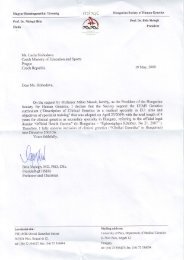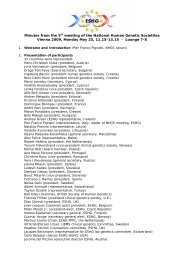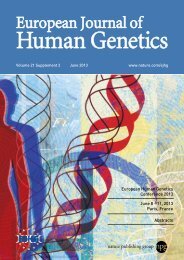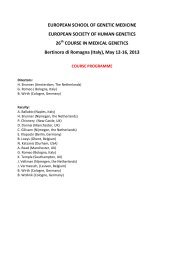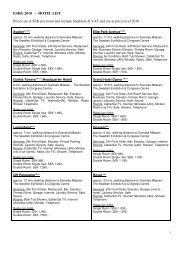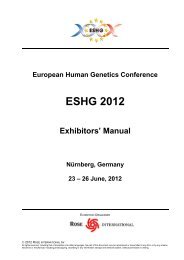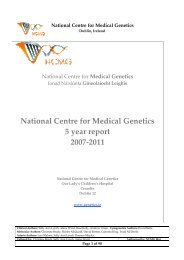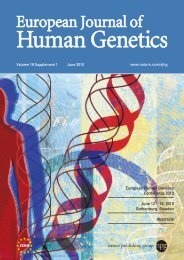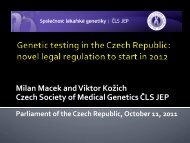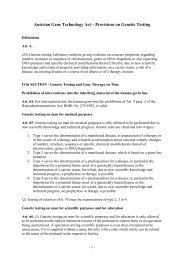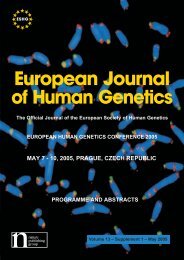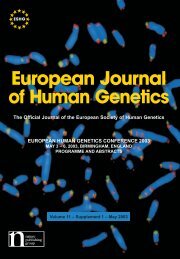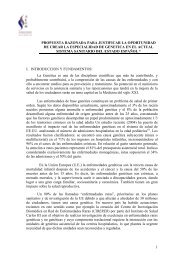2008 Barcelona - European Society of Human Genetics
2008 Barcelona - European Society of Human Genetics
2008 Barcelona - European Society of Human Genetics
Create successful ePaper yourself
Turn your PDF publications into a flip-book with our unique Google optimized e-Paper software.
Genetic counselling, education, genetic services, and public policy<br />
were analysed, major themes identified and data triangulated. These<br />
findings were validated with quantitative data collected from midwives<br />
responding to a state-wide survey (n=317, response rate 45 .4%) . Our<br />
findings indicate that there is variation in the genetic practice <strong>of</strong> midwives<br />
. While each midwife’s practice is contingent on their individual<br />
competence, the scope <strong>of</strong> their practice is heavily influenced by the<br />
organisation in which they work . For example, each hospital provides<br />
specific guidelines on what information needs to be collected to determine<br />
genetic risk, and what genetic tests should be discussed with<br />
each pregnant woman. These findings suggest that programs that<br />
only target midwifery competence will not be enough to effect practice<br />
change . Instead, for midwives to provide an effective and high quality<br />
genetic service, a two pronged approach targeting midwifery competence<br />
and addressing organisational policy is required .<br />
P09.08<br />
Genetic counseling for newborn hearing screening in Nagano,<br />
Japan<br />
S. Maruyama1 , A. Sakurai1 , S. Usami1 , Y. Takumi1 , H. Moteki1 , K. Hayashi1 , S.<br />
Nishio1 , M. Maeda2 , A. Mizuuchi1 , M. Arakawa1 , R. Kawamura1 , Y. Yamanouchi1<br />
, H. Yamashita1 , M. Tamai1 , T. Kosho1 , K. Wakui1 , T. Wada1 , Y. Sekijima1 , Y.<br />
Fukushima1 ;<br />
1 2 Shinshu University School <strong>of</strong> Medicine, Matsumoto, Japan, Support Center for<br />
Children with Hearing Loss, Matsumoto, Japan.<br />
Congenital deafness is a disorder with high prevalence (1/1,000 birth)<br />
and that requires early diagnosis and medical intervention to minimize<br />
the morbidity <strong>of</strong> the affected infant . Since 50% <strong>of</strong> congenital deafness<br />
is caused by genetic defect and clinical phenotype and prognosis in<br />
part depend on genetic background, genetic testing for affected infants<br />
can provide useful information . In Japan, a newborn hearing screening<br />
has started as a government project in 2000 . In Nagano prefecture<br />
<strong>of</strong> Japan (population 2 .2 million), a screening program has started in<br />
2002 . In 2007, under the collaboration and coordination among medical-,<br />
educational- and administrative staffs, the Support Center for<br />
Children with Hearing Loss has opened to support both affected children<br />
and their parents . Division <strong>of</strong> Clinical and Molecular <strong>Genetics</strong> in<br />
Shinshu University Hospital also collaborates with this center as a provider<br />
<strong>of</strong> genetic counseling . Since 70% <strong>of</strong> genetic congenital deafness<br />
is an autosomal recessive disorder, most parents <strong>of</strong> affected children<br />
have normal hearing, thus do not consider the possibility <strong>of</strong> genetic<br />
causes on their affected children . This also suggests that the burden<br />
<strong>of</strong> patients could be more intense when they know the diagnosis <strong>of</strong><br />
their children .<br />
We performed a questionnaire-based survey to clarify psychological<br />
impact <strong>of</strong> parents and what they needed during hearing screening, before<br />
and during genetic testing, and after being informed a diagnosis .<br />
Results <strong>of</strong> this survey clearly indicated the importance <strong>of</strong> genetic counseling<br />
during screening program and intense collaboration between the<br />
Center and community medical staffs such as public health nurses .<br />
P09.09<br />
Development <strong>of</strong> a set <strong>of</strong> core competences in genetics for health<br />
pr<strong>of</strong>essionals in Europe<br />
H. Skirton 1 , C. Lewis 2,1 , A. Kent 2 , D. Coviello 3 ;<br />
1 University <strong>of</strong> Plymouth, Plymouth, United Kingdom, 2 Genetic Interest Group,<br />
London, United Kingdom, 3 Fondazione IRCCS, Ospedale Maggiore Policlinico,<br />
Mangiagalli e Regina Elena, Milan, Italy.<br />
The increasing use <strong>of</strong> genomics within a wide range <strong>of</strong> health care<br />
settings requires health pr<strong>of</strong>essionals to develop relevant expertise in<br />
genetics to practise appropriately . There is a need for common minimum<br />
standards <strong>of</strong> competence in genetics for health pr<strong>of</strong>essionals in<br />
Europe. However, there are significant differences in pr<strong>of</strong>essional education<br />
and practice across Europe and setting common curricula is not<br />
practical . It was agreed by the Expert group <strong>of</strong> the EuroGentest project<br />
Unit 6 that a pragmatic solution would be to describe and agree, by<br />
consensus, a set <strong>of</strong> core competences that could apply to health pr<strong>of</strong>essionals<br />
in Europe, whatever their national setting .<br />
The core competences were based upon existing frameworks, modified<br />
for the <strong>European</strong> context. They relate to i) pr<strong>of</strong>essionals whose<br />
specialisation is in genetics and ii) pr<strong>of</strong>essionals who are generalists<br />
or specialise in an area <strong>of</strong> health care other than genetics . Recommendations<br />
have been based on work that was developed in consultation<br />
with the particular group <strong>of</strong> pr<strong>of</strong>essionals involved . The goal <strong>of</strong> this<br />
work is not to be prescriptive, but to provide frameworks that can be<br />
adapted to national and pr<strong>of</strong>essional need . Curricula for a range <strong>of</strong><br />
health pr<strong>of</strong>essionals, both pre-registration and post-registration, can<br />
be built or modified using the competences.<br />
In this paper, the process <strong>of</strong> development, the competences and suggested<br />
learning outcomes will be discussed . The competences and<br />
a background document can be viewed on the website <strong>of</strong> the Euro-<br />
Gentest project [http://www .eurogentest .org/] . The project team invites<br />
feedback .<br />
P09.10<br />
Genetic counsellor : News from France<br />
C. Cordier1,2 , N. Pasz2 , M. Voelckel3,2 ;<br />
1 2 Department <strong>of</strong> Cytogenetics, Mulhouse, France, French Association <strong>of</strong> Genetic<br />
Counsellors, Marseille, France, 3Department <strong>of</strong> Medical <strong>Genetics</strong>, Marseille,<br />
France.<br />
The Pr<strong>of</strong>essional Master « Genetic Counselling and Predictive Medicine<br />
» made possible the education <strong>of</strong> the first French Genetic Counsellors,<br />
since 2005 . Two years later, there are 34 graduated, 23 <strong>of</strong><br />
them have a job and 4 <strong>of</strong> them have a job <strong>of</strong>fer .<br />
Thanks to the data from the French Association <strong>of</strong> the Genetic Counsellors;<br />
the AFCG (Association Française des Conseillers en Génétique),<br />
we suggest to present the interdisciplinary recruitment, the job<br />
progression in France, and the way managed to its valorisation .<br />
We will specify the annual number <strong>of</strong> new graduated, and the Genetic<br />
Counsellors location in France and in a couple <strong>of</strong> countries . Then, we<br />
will insist on the processing action for a national, <strong>European</strong>, and international<br />
integration <strong>of</strong> these new French pr<strong>of</strong>essionals .<br />
P09.11<br />
<strong>Genetics</strong> counseling:misdirection and misuse in some<br />
developing countries<br />
M. Shariaty;<br />
Cancer Research Institute, Tehran, Islamic Republic <strong>of</strong> Iran.<br />
Practically genetics counselling began with Eugenic movement around<br />
1910 in England,USA and some western countries with very negative<br />
and destructive effects on health and integrity <strong>of</strong> humankind . Fortunately<br />
,the misuse <strong>of</strong> genetics was <strong>of</strong>ficially abandoned in 1944 though<br />
practically persisted up to 1960s .<br />
Medical <strong>Genetics</strong> counselling based on dignity and equality was introduced<br />
by Sheldon Reed in 1944 and became an obligate branch <strong>of</strong><br />
modern clinical and medical genetics settings .<br />
In Islamic countries <strong>Genetics</strong> counselling was introduced by the author<br />
in 1968 based on the same principles thought by my mentor pr<strong>of</strong>essors<br />
Reed,Vogel and Fuhrmann,and considering all <strong>of</strong> the humanitaria<br />
n,ethical,moral ,and religion issues concerning the clients .Since 1968<br />
i have counsulted more than 17000 couples,majority seeking consanguineous<br />
marriage . Only less than 2% <strong>of</strong> these young healthy couples<br />
seeking marriage actually needed karyotyping .<br />
Unfortunately,in the last several years in some developing<br />
countries,genetics counselling has been misunderstood and misused<br />
due to financial interests <strong>of</strong> private centers.It is quite wrong but popular<br />
practice to order karyotyping for every marriage or every disease that<br />
carries the label <strong>of</strong> being due to genetics .s disease .I have seen many<br />
examples <strong>of</strong> ordering karyotyping for Duchene muscular dystrophy,tha<br />
lassemia,hemophilia,phenylketonuria and cystic fibrosis .<br />
Based on these facts I am proposing a universal medical guideline<br />
for every <strong>Genetics</strong> counselling center and every genetics counsellor<br />
based on medical,ethical,humanitarian ,and religion principles so that<br />
the needy clients could not be misused and financially and morally<br />
exploited .<br />
P09.12<br />
Cystic fibrosis cascade carrier testing in Victoria, Australia: an<br />
audit <strong>of</strong> clinical service<br />
B. J. McClaren 1,2,3 , M. A. Aitken 1 , R. J. Massie 1,4,2 , S. A. Metcalfe 1,2 , D. J.<br />
Amor 3,2,1 ;<br />
1 Murdoch Childrens Research Institute, Melbourne, Victoria, Australia, 2 The<br />
University <strong>of</strong> Melbourne, Victoria, Australia, 3 Genetic Health Services Victoria,<br />
Melbourne, Victoria, Australia, 4 Royal Children’s Hospital, Melbourne, Victoria,<br />
Australia.<br />
In Victoria, Australia, carrier testing for cystic fibrosis (CF) is performed<br />
by a single state-wide laboratory and counselling service . CF carrier



